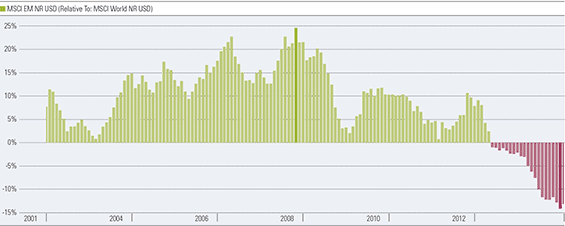The investment outlook for emerging markets may seem particularly uncertain. For many years, the case for exposure seemed very clear, at least from a performance point of view. As Figure 1 below demonstrates, so long as investors hung on for at least three years, the investments should have added performance to the overall portfolio.
More recently though, emerging markets have suffered a series of setbacks, including the impact of the European sovereign debt crisis and finicky asset flows caused by quantitative easing. To make matters worse, some country-specific issues have obscured the positive fundamentals that had long attracted investors.
China's transition to an economy led by domestic consumption may seriously inhibit its growth, and inflation, combined with poor fiscal policies, threatens to derail countries such as Brazil and India.
Meanwhile, the distinction between investing in developed and emerging markets has become quite murky, making the decision about how to access the asset class even more complex.
The case for exposure to emerging markets
The case for exposure to emerging markets remains intact despite this rocky patch.
- Equity investing is a long-term game so we don't advocate retail investors try to time switches between developed and emerging markets;
- Many emerging countries continue to have strong fundamentals, such as high savings rates, rapid income growth and solid economic potential. In a 2013 commentary called "The Case for Emerging Market Equity: What You Need to Know," Schroders made the valid point that emerging markets comprise about 41% of the global economy but only 13% of global stock markets -- an imbalance that should equalise over time; and
- A more nuanced country and company-specific outlook in both developed and emerging markets only adds to the diversification argument.
The blurring line between developed and emerging
Broad-brush characterisations of emerging versus developed markets are increasingly irrelevant. That's certainly true at the company level.
Consider Nestlé. It's listed in Switzerland but about 45% of its sales are in emerging markets and that proportion is growing fast. Similarly, China Mobile is listed in Hong Kong but most of its business is in mainland China. Samsung Electronics provides an example of the reverse. It's domiciled in South Korea but sources more than 50% of its revenue from the US and Europe.
Even index providers don't agree about classifications at the country level. For example, FTSE says South Korea is a developed country while MSCI classifies it as an emerging market (though it's under review).
A decade ago, few global equity funds invested but today it's common. And even if it's not in their index, many managers take off-benchmark positions to emerging markets. For instance, an Australian fund such as MFS Global Equity Trust has an emerging market holding of less than 3% but typically it holds a number of developed market names that sell into emerging markets, such as Diageo and Nestlé.
All said and done, diversified global equity managers hold increasingly meaningful stakes in emerging markets. Indian investors too must think beyond their domestic shores. Do read The logic behind international funds and Why you should look at global funds to understand why we must also consider stock markets across countries.
Figure 1: MSCI Emerging Markets Excess Return over MSCI World 3-year Rolling Returns – January 1, 1998 to December 31, 2013

This article originally appeared on Morningstar Australia and has been written by research analyst Alex Prineas. It has been edited for an Indian audience.